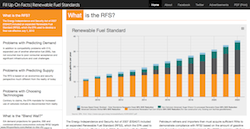American Petroleum Institute’s Downstream Group Director Bob Greco told reporters this morning in a press call that they are launching another multi-faceted ad campaign targeted at the Renewable Fuel Standard (RFS) in anticipation for Environmental Protection Agency’s (EPA) final rules set to be announced by November 30th.

API has launched another anti-biofuels and anti-RFS campaign. The ethanol industry is fighting back.
“Our ads focus on the negative consequences that higher ethanol mandates EPA is considering could have on consumers, including unexpected repair bills and potentially broad harm to our nation’s economy,” Greco said.
The ethanol industry has been fighting Big Oil about the RFS for years now and there is no end in sight. According to Bob Dinneen, President and CEO of the Renewable Fuels Association (RFA), Big Oil is pressuring the EPA to keep blending levels below mandates.
“Much like an uncontained oil spill which obliterates everything in its path, as we approach the deadline for the EPA to release its final RFS rule Big Oil and its congressional supporters are pulling out all the stops by completely obliterating the truth,” said Dinneen. “The blend wall narrative has been perpetuated by the petroleum industry as a way of creating fear among consumers about ethanol, while simultaneously greatly restricting their choices at the pump.
“If the blend wall is such an impenetrable barrier to increasing the amount of biofuels that can be blended with gasoline, as has been claimed by the petroleum industry, how can it explain that, according to data recently released by the Energy Information Agency, in 2013 ethanol comprised more than 10 percent of gasoline consumption in 22 states and the District of Columbia? As one would expect, the EIA data includes the Midwestern agricultural states of Minnesota, Illinois, Indiana, Ohio and Michigan. But a number of coastal states also broke through the so-called blend wall in 2013, including Louisiana, Massachusetts, California and New Jersey. All of these states sailed past the 10 percent ethanol level, and there have certainly been no claims of ‘harmful economic effects’ coming from them. Nationally, ethanol constituted 9.75 percent of gasoline consumption in 2013, according to the EIA data — above the supposed limit of 9.7 percent supported by Big Oil.
Dinneen added that API needs to stop trying to scare consumers about biofuels in an attempt to protect their monopolistic market share. “Consumers rightly deserve to have choices at the pump and to hold onto more of their hard-earned dollars. The RFS is working. No amount of advertising by Big Oil will change that fact.”

